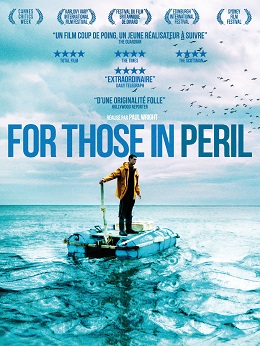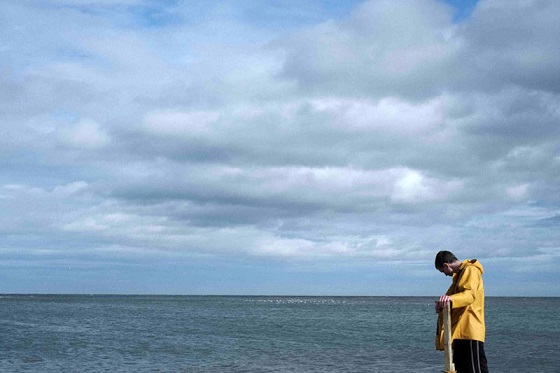[Swiss Fist]
 Every once in a while, a green director will get so lost in the creation of atmosphere that they forget to finishing sewing the fabric of their picture together, leaving just the shell of a story and characters whilst fully fleshing out the tone and texture of that world. This kind of filmmaking is tough to critique, for while a very gorgeous picture with fantastic performances may indeed be there, the movie as a whole suffers from an absence of narrative and structure. Such is the case with rookie director Paul Wright, whose debut feature, For Those in Peril, taps into the ennui of community isolation, personal shame, and catastrophic loss without ever confronting the meaning of any of these issues for its characters or their world.
Every once in a while, a green director will get so lost in the creation of atmosphere that they forget to finishing sewing the fabric of their picture together, leaving just the shell of a story and characters whilst fully fleshing out the tone and texture of that world. This kind of filmmaking is tough to critique, for while a very gorgeous picture with fantastic performances may indeed be there, the movie as a whole suffers from an absence of narrative and structure. Such is the case with rookie director Paul Wright, whose debut feature, For Those in Peril, taps into the ennui of community isolation, personal shame, and catastrophic loss without ever confronting the meaning of any of these issues for its characters or their world.
For Those in Peril opens in a salty Scottish fishing town, and follows the tribulations of Aaron (George MacKay) after a traumatic incident the young man had at sea. The audience learns that Aaron is the sole survivor of a maritime accident that claimed the lives of five men not long before this movie begins. One of these men was Aaron’s older brother, whose loss weighs heavily on Aaron’s conscience. Compounding this horrific tragedy is the attitude of the small fishing community, most of whom look upon Aaron as some kind of cursed being in the seafaring tradition of a “Jonah.” Thus a conflict is set up whereby Aaron must overcome the grief of his own personal loss, as well as the not-so-silent recriminations of his neighbors.
That’s about it, though.
As a film, For Those in Peril never really gets out of its first act, and more or less contents itself with a 90 minute exploration of one young man’s personal torment. It’s an interesting topic, to be sure, and other maritime pictures have explored it, and well. Take Master & Commander, for example, or one of the best films from SIFF last year, the Icelandic thriller The Deep. Both of these movies explored the after-effects of enduring a harrowing incident at sea, and how survivor’s guilt can devastate a person long after the physical scars of that ordeal have healed. Yet unlike For Those in Peril, these movies utilized what one might call the “Jonah” syndrome as a compliment to a bigger story, and used the experience to develop larger themes and plot components.
For Those in Peril seems entirely content to keep its focus on Aaron’s struggles during the immediate aftermath of his disaster at sea. Although hints are provided via a series of flashbacks and fragmented conversations that Aaron had a whole host of problems well before the accident, none of this information comes close to informing the audience who the guy is, or why they should care about him (except out of pity). Strong performances are turned in by Kate Dickie, as Aaron’s mom, and Nichola Burley, the girlfriend of Aaron’s lost-at-sea brother, yet their presence in the picture only further confuses the overall construction of the story.
The fact that Aaron’s mom and his brother’s girlfriend seem to have nothing but sympathy for him whilst everyone else in the small fishing community bear nothing but outright disdain for the young man paints a very confusing picture that is difficult to reconcile. Without any background on this community, or the people living in it, an audience member is left with a lot of questions concerning the brutal treatment of Aaron at the hands of his peers: nearly all of whom seem angry that Aaron is still alive. Although an exploration of the town’s unique mythology in relation to a fable about a devil fish does lay something of a thematic foundation early on, it’s hard to square that with the out-and-out hostility Aaron faces throughout For Those in Peril.
What is the director (and his film) trying to say about human nature, loss, forgiveness, redemption, or hope with all of this? One gets the sense that there were a number of good intentions in this regard, but a slew of silent, Terrence Malick-esque shots of characters standing before sun-drenched curtains and the like don’t come anywhere near a bridging of this divide. As Mr. Wright’s picture progresses, and Aaron grows more and more desperate to find answers for questions that torment him and those in his community, the truth seems to only drift further and further out of reach.
Which is kind of funny, for this almost creates a feeling reminiscent of a person lost and adrift at sea: a person screaming and reaching for a distant ship moving away faster than any human could possibly hope to swim. It’s hard not to feel this way when watching For Those in Peril, as the outlines of an interesting movie are there, almost in-reach, yet never near enough to grasp. A decent enough cinematic experience, if only for texture and atmosphere, Mr. Wright’s directorial debut is a fair start, and would be a tolerable enough way to spend some time at the 40th Annual Seattle International Film Festival, where it is currently playing.







Comments on this entry are closed.